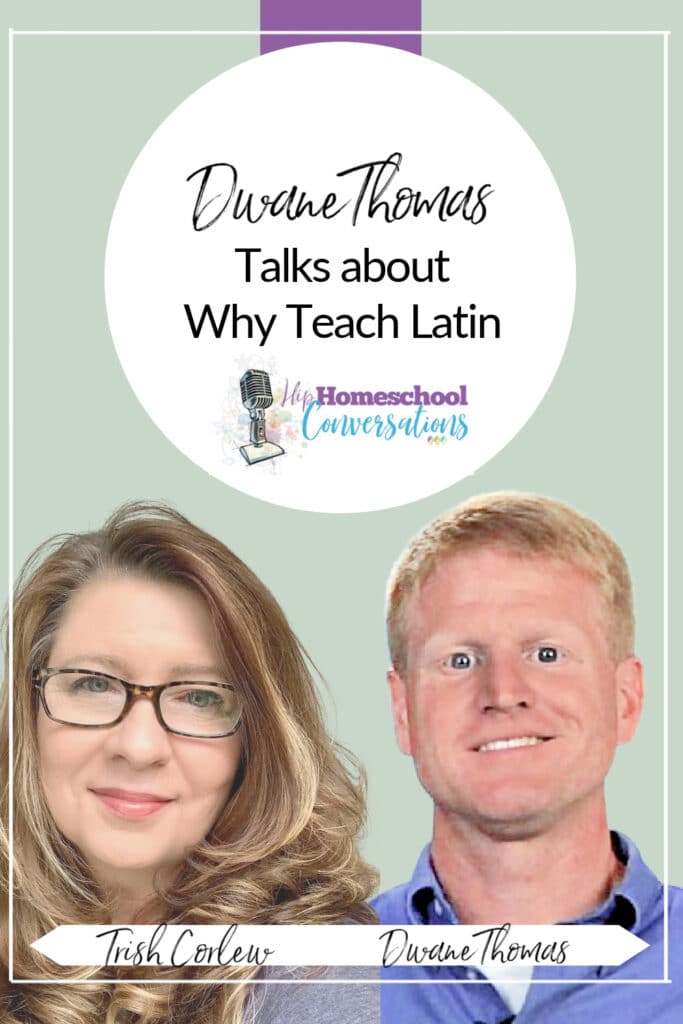Episode 27 – Why Teach Latin?
Why Teach Latin?
Trish has a homeschool conversation with Dwane Thomas about why we should consider teaching Latin in our homeschool. If you’ve encountered Latin as a homeschooler, you’ve probably heard of Dwane Thomas, a long-time scholar, and instructor of Latin.
His interest in learning languages began early in life. Dwane spent much of his early life in Europe, the son of a military dad. And when his sister mastered Dutch before he did, Dwane decided that would never happen again! When their family moved to Germany, he jumped into learning the language and has been a student of languages ever since.
Dwane Thomas is known for his entertaining educational videos, Visual Latin, as well as the etymological wonder, WordUp! He has authored books and regularly teaches Latin online via his website, dwanethomas.com. In this podcast, Dwane shares insightful tips on the history of Latin, the difference between a frozen language and a “living, moving, wild language” like English, and even offers a reason or two you might not want to learn Latin. If you are a homeschooling parent trying to decide whether your kids should learn Latin … and if so, when and how to start, this podcast has the answers you need. If your kids have started learning Latin and you’re wondering what’s next, Dwane provides insights into future steps they can take. And if the only Latin you can speak at this point in your life is carpe diem, you’ll definitely want to tune into this encouraging conversation between Dwane Thomas and Trish Curlew!
Meet The Guess

Website | Facebook | Instagram | Pinterest | Youtube | Twitter
Dwane Thomas has studied languages for most of his life. Born and raised in Europe, he grew up surrounded by languages. For more than twenty-five years, Dwane has taught Latin. He began teaching online in 2011.
Dwane is the author of Visual Latin, Word Up, and Via: How to Latin, and Almost Anything Else. He and his wife live in Franklin, Tennessee.
Show Notes are below

This show is sponsored by Compass Classroom. Compass classroom offers an online homeschool curriculum that is faith-based. Their courses include History, Language Arts, Science, Latin, Logic, Economics, Art, Music, and more. Theirs is a truly engaging curriculum from a Christian worldview.
You can purchase the courses one at a time or really save money and get their membership for a super affordable price. Intrigued? You can try it for free here. You don’t even need a credit card to sign up for the one-month free trial period.

So Why Teach Latin?
Quotes from Dwane Thomas
“I was into the founding fathers, and I was reading a bunch of their stuff and found it fascinating that all of them knew Greek and Latin, and I wanted to know, what was that about? I wondered if there was something to it if it shaped their thinking. So, I decided to teach myself Latin and threw myself in.”

“Latin is a language frozen in time. … When you’re dealing with a living, moving, wild language like English, it’s hard to get the thing to behave. It’s like chasing a two-year-old around the house and trying to get it to do what you want, whereas Latin is done.”
“If you want to learn Spanish or you want to learn French, go learn those languages. You can always come back to Latin later.”

“Watch WordUp and learn a whole lot of vocabulary and see how Greek and Latin influence our language. And if you want to go further, Visual Latin is available.”

“I have encountered quite a few moms [who] feel like they are inadequate … they feel like they are ‘less than’ because they don’t teach their kids Latin. That is nonsensical.”

“I have met so many people who have had long, fulfilling lives who don’t know a word of Latin, right? Or maybe they know carpe diem, and that’s it. I find the idea absurd that you have to study it and that you’re somehow not measuring up if you don’t.”
“Visual Latin is designed to intentionally teach you Latin grammar within two years, so you can get the grammar over with and then you can read in that language. My suggestion after that would be to read one of the Gospels in Latin.”

Show Notes [transcript]
Welcome to the Homeschool Conversations Podcast, a podcast hosted by Hip Homeschool Moms. This is a show all about the homeschool lifestyle and things that impact homeschool life.
This show is sponsored by Compass Classroom. Compass classroom offers an online homeschool curriculum that is faith-based. Their courses include History, Language Arts, Science, Latin, Logic, Economics, Art, Music, and more. Theirs is a truly engaging curriculum from a Christian worldview.
You can purchase the courses one at a time or really save money and get their membership for a super affordable price. Intrigued? You can try it for free here. You don’t even need a credit card to sign up for the one-month free trial period.
Trish:
Today we’re talking with someone I love listening to and watching. Although you don’t get the luxury of watching him today, by the end of this conversation I suspect you, too, will love listening to him and hope you’ll head over to the website and watch Dwane so that you can see what I’m talking about.
Let me introduce you to Dwane Thomas, and I’ll let him tell you a little bit about himself.
Dwane:
My name is Dwane Thomas. I teach Latin.
I’m the author of the Visual Latin series, and although I should probably apologize for it, I’m also the author of the Word Up series, which is a little wacky. I’ve also written a book on how to learn languages and how to learn Latin. I run a website Dwanethomas.com and I teach languages over there as well. I’ve been doing this for 25 years. I went online in 2011 and have been teaching online since then.
How many years is that? I’m terrible at math. There are three kinds of people in the world, those who are good at math and those who aren’t.
Trish:
My kids have taken WordUp! and Visual Latin, so I have the luxury of knowing his personality. He is so much fun.
Dwane, tell us how you got to teaching Latin and how you even got interested in languages.
Dwane:
I got interested in languages at a young age. I was born in England. My dad was with the military. We ended up in Europe. I came to the States when I was 18 or 19, right after the Berlin Wall fell; when our base in Germany closed, we came back to the US.
I spent most of my life growing up in Europe and when I was nine or so years old, we moved to the Netherlands. We lived there for four years, and my sister went to a local Dutch school. Mom and Dad put me in a Department of Defense school. I’m not really sure why, so I went to school on base and she went to school locally.
Trish:
Does this tell us something about you? Did you need to be in military school? LOL.
Dwane:
Maybe. I was actually a terrible student, so they ended up pulling me out of that school and putting me in a private school because I was not well-behaved in public school.
Anyway, she went to a local school in the Netherlands, and she ended up learning Dutch. I didn’t because I was hanging around with Americans all the time. When we moved to Germany, I hit the ground running. I told myself I wasn’t doing this again.
We moved all the time, and I knew we were going to move again soon, so I told myself, I don’t know how long I have in Germany, so I’m going to learn German as fast as I can. I did, and I’ve been doing it ever since.
That sparked my interest in languages.
Trish:
Since you are a Latin teacher, what do you say to people when they tell you Latin is a dead language?
Dwane:
I tell students frequently I don’t think Latin is dead. I think it’s frozen. Let me explain what I mean by that.
Latin is a language frozen in time. I’m painting with very broad strokes here but the estimates are that Latin has about 75,000 words in the language. You won’t need to learn all those words, of course, to learn the language.
Modern German has about 250,000 words in it, from the estimates I’ve seen. French has something like 500,000 words in it. English has anywhere from 650,000 to a million words in it, and they’re constantly adding words.
I read a book years ago by a man named Charles Hodgson. The name of the book was Global Wording: The Fascinating Story of the Evolution of English. He talked about the fact that 100 to 150 words come into the English language daily because of all the technology, because of the languages, and cultures we’re dealing with. There are more English speakers in India, for example, than there are in the United States, so Indians are affecting the language now. This is a whole other fascinating topic.
When you’re dealing with a living, moving, wild language like English, it’s hard to get the thing to behave. It’s like chasing a two-year-old all around the house and trying to get it to do what you want it to do, whereas Latin is done. There are some nerdy guys who keep adding words to the language, but for the most part, Latin is done. You’re not dealing with a living, moving, wild animal; it’s a tame language to deal with, so to speak.
Not only that but Latin is not filled with exceptions. If you’ve ever studied French or Spanish or Italian, or English, you know there are so many exceptions to every rule. That drives you bananas. You don’t have to deal with that in Latin because it’s orderly, it’s behaved, it’s tame.
Author JRR Tolkien who wrote The Hobbit and Lord of the Rings, was a philologist, a language scholar. He spoke 17 languages, three of which he made up on his own. He said somewhere in his writings that Latin was his favorite because it was the most well-behaved. From Latin, he could then spring to other languages and see how they worked. He could handle the wild two-year-old because he knew what the language was supposed to be doing.
Trish:
That’s a fascinating analogy too, I love the “wild toddler” thought because those of us who have kids can relate to that.
Dwane:
Most of your listeners likely grew up speaking English, but if you ever step back from English and look back at it, you might have, good grief what a wild mess this is. For those who speak English as a second language, they’ll know exactly what I’m talking about.
There are so many exceptions. It’s a beautifully misbehaved language.
Trish:
Honestly, as a teacher and homeschool mom, it’s a challenge to teach English for that very reason. You’re talking to the homeschool moms over here who must make sense of all this craziness of our language for our kids. There are so many words that sound alike and mean different things; one word is spelled this way, and another is spelled almost exactly like it, but it has a completely different pronunciation, so it is a wild language.
I like that because I have heard people say don’t learn dead languages; learn living languages, but we did learn Latin, and loved Latin. I wanted to hear what your thoughts were around that thought though.
Dwane:
Yes, that’s one reason to learn it. I go back and forth even in my own head on this. People ask me, what should you learn first, Latin or Spanish? Or Latin or Italian? These days I tell people, “If you want to learn Spanish or you want to learn French, go learn those languages. You can always come back to Latin later.”
I didn’t start Latin until I was 23 years old and college was over. I did not major in Latin or study Latin in college. I’m self-taught, and I learned it late. I tell my students now, “If you know you want to learn Spanish, learn Spanish. If you never get to Latin, at least you’ll know Spanish. But if you do decide to go to Latin, it will be easier for you. My best students are always Hispanic students. They get it. They get it so fast. They outpace all of us English speakers because the languages are so similar that they pick up on connections super-fast.
Trish:
Wow, I knew people that know multiple languages and pick up other languages quickly, but I hadn’t thought about the fact that a base language or mother tongue might impact your ability to pick up a new language. That’s interesting.
Is there a right age for learning Latin?
Dwane:
That comes back to what I was saying a minute ago. Let’s say you have to take two years of some language in high school. So, let’s say you want to go ahead and get a head start when you’re young. Then I would suggest starting Latin in 3rd or 4th grade and recommend taking it easy, like with Visual Latin; you can spread it out over four years if you want to.
Some people do it in six months. They’re in a rush and they get it done. Some people spread it out over four years. I’ve seen it done different ways; that’s totally an option. That’s the beauty of it.
If you don’t have cousins who speak French, your family doesn’t take mission trips to a Spanish-speaking country, there’s no reason that you’ve got to learn Spanish or French, then sure, start with Latin. Middle school would probably be the best place to start.
Trish:
That’s about the time we did it. You hear that when people are moving into a heavy science-oriented career like botany or zoology or oceanography, where there are a lot of Latin roots, it can be extremely helpful. That was the reason I wanted to teach Latin to my kids. And, of course, you make Latin fun. You actually have a term for it.
What’s your term for the way you teach Latin?
Dwane:
I’ve been teaching for over 25 years, and a lot of that has been with elementary kids. Some of it has been with disadvantaged elementary kids. Latin puts people to sleep, let’s be honest. That’s usually how the game is played, so I had to figure out a way to entertain the kids and educate them. I ran these two words together, and I call it edutainment.
It’s a little bit ridiculous, plus rigorous study of the language.
Trish:
And it’s fun; I can tell you, having done it. WordUp! is absolutely hilarious. It is such a fun program. Could you use that as the intro? Or do you need to learn Visual Latin first?
Dwane:
We built Visual Latin, and it was kind of on the serious side, even though we had a lot of fun with it. But then people kept asking us for some sort of etymology program they could use to boost their kids’ vocabulary and not necessarily learn Latin.
That’s how WordUp! was born. At this point, honestly, I would probably flip it and say watch WordUp first. You can watch that at any age. Watch WordUp and learn a whole lot of vocabulary and see how Greek and Latin influence our language.
And if you want to go further, Visual Latin is available.
Trish:
There you go! That’s perfect. WordUp! is so much fun, I highly recommend it. It’s available on at Compass Classroom. At the moment, they have a 30-day free trial, and you don’t even have to use a credit card to take advantage of that free trial, which I absolutely love.
So, Dwane, what are some of the questions people constantly ask you? I know, being a teacher of Latin, you don’t always recommend it. I find that fascinating. When would you say it’s absolutely critical that you need to take it?
Dwane:
I homeschooled my kids. I was homeschooled by my parents in the ‘80s. So, I’ve been at this game for a long time. I get a lot of emails about this. I’ve been teaching Latin for 25 years, so people know me for it.
I have encountered quite a few moms via email, via phone conversations, and in face-to-face conversations where they feel like they are inadequate, they feel like they are not performing well enough, and they feel like they are “less than” because they don’t teach their kids Latin.
If I could give a bigger eye roll to that, I would. That is nonsensical.
I have met so many people who have had long, fulfilling lives who don’t know a word of Latin, right? Or maybe they know carpe diem and that’s it. I find the idea absurd that you have to study it and that you’re somehow not measuring up if you don’t.
I would say if you want to take it, I’m happy to help.
Visual Latin, by the way, was designed to help with any curriculum.
When I decided I was going to teach myself Latin, I was into the founding fathers. I was reading a bunch of their stuff and found it fascinating that all of them knew Greek and Latin. I thought, What is that about? I wondered if there was something to it. I wondered if it shaped their thinking, so I decided to teach myself Latin.
I threw myself in and I kept falling asleep in the middle of every Latin textbook I read. They were all so boring. I thought there has got to be a video course. I went looking for one and there wasn’t. That’s when Thomas Purifoy and I got together and created Visual Latin, just to see if it would work.
And it did! I just wanted a video course for myself, to keep me from falling asleep. It really works with any course. Latin is Latin.
Trish:
What is Ecclesiastical Latin and what is Classical Latin? What is the difference and why should anyone care?
Dwane:
To explain it as quickly as I can, it’s the same language. There’s no difference except in pronunciation; scholars get hung up on classical Latin. They want everybody to pronounce Latin using something called the Restored Classical Pronunciation, which was restored by scholars.
There are no audio files; they reconstructed it from text; they reconstructed it from stones and from the writings of ancient Roman grammarians. They restored the classical pronunciation and that’s what you’re going to hear in classes and universities, particularly from Northern Europe and in the United States. It’s one way of pronouncing it; the technical term is the Restored Classical Pronunciation because it has been restored.
I always remind my students that they restored the pronunciation using tombstones. There is some impressive scholarship that goes into it. I’m not knocking that, but still …
Ecclesiastical Pronunciation is the pronunciation that has been used by the Catholic Church since the days of Dante. It’s about 700 years old and it goes by three names: it’s sometimes called Ecclesiastical Pronunciation, Church Pronunciation, or the Italian Pronunciation.
Personally, I want to hear what the Italians have to say when it comes to pronouncing Latin because well that’s where Rome was located. The Italians have been there the whole time.
I default to Ecclesiastical Pronunciation. Now which one’s right? That’s like asking which English pronunciation is correct: Canadian, American, Australian, or British. You can’t answer that question. They’re all correct.
I don’t know why there’s such a strong debate on this, but there is, and, it’s a little bit odd.
I go with the Italian pronunciation. Basically, it comes down to how you pronounce the letter V and how you pronounce the letter C.
Julius Caesar either said, when he overtook his enemies, “Veni, vidi, vici,” and that’s the ecclesiastical pronunciation, or he said “wini, widi, wiki,” which is the classical pronunciation.
Trish:
That’s hilarious! To give you a taste of Visual Latin and WordUp! that’s it right there. Dwane always brings the funniest aspects into it. Thank you so much for creating something that kids love.
How many languages do you speak?
Dwane:
I’m working on six languages but don’t speak them all. I can read them all, but some of them are covered in scaffolding and still being built there in my head.
Trish:
Latin seems like it would be a great thing to learn in high school, but is there something after Latin? How does someone use it? Can you read Latin books to help you grow your understanding and expertise in the language?
Dwane:
After you learn Latin, as far as I can tell, most people tend to go down one or the other fork in the road.
Visual Latin is designed to intentionally teach you Latin grammar within two years, so you can get the grammar over with and then you can read in that language. My suggestion after that would be to read one of the Gospels in Latin.
Not many people can do that, and that is the goal of Visual Latin—that students will be able to do that at the end of two years. It’s a tough course. But at the end of two years, they should be able to read one of the Gospels with dictionaries to look words up as needed.
From there you can either go deeper into the Roman classics and you can start reading stuff by Caesar and Virgil and Roman historians; that’s typically where most high school and college Latin programs are going to steer students. That’s one direction you can go: deeper into ancient Roman writings. There is a lot of stuff written by the Romans. There’s also a ton of medieval Latin and you can go into that. You can spend the rest of your life doing that.
Some scholars spend the rest of their lives poring over these old books; they end up looking like Gandalf smoking a pipe looking over all these old parchments. You may end up a little bit lonely, smoking a pipe in a room with a bunch of papers.
The other direction you could go is the one I’m currently on. I’ve gone in the other direction but I wanted to test it and see what it would be like going in this direction. I’m enjoying this one. And that is, going into the Romance languages. After I learned Latin, people were telling me that I was pronouncing Latin words incorrectly. I would tell them, that’s strange because we really don’t know how it’s pronounced … but whatever.
So I wanted to know what the Italians had to say about this. So I said, “Okay fine, I’m going to teach myself Italian.” I did that and that got me started on the Romance languages. Then I taught myself Spanish and I’m currently teaching myself French. It’s just enjoyable. I’ve been to some of these countries where you can go and use the language. You can order food and talk to people and they’re excited when you can speak their language. You can read street signs, read books, and watch movies, podcasts, and shows in the language.
I find that to be a lot more rewarding than poring over ancient Roman authors. Which is fine. I’ve done that, too. Some people like that route but for me and for most of my students, I’m enjoying the basics of Latin, getting it over with, and then using that to steer into the Romance languages. When I say Romance languages, you can see the word Roman right in the word; basically, wherever the Roman Empire was, basically where the romance languages are located.
Trish:
Fascinating!
One last question, if students start learning Latin in middle school and take it slow, is there any problem with spreading it out over four, five, or six years and using Visual Latin as a base for that? Or would you recommend them going a little faster and then moving into other romance languages? Or is it really down to personal preference, and what a family wants to do?
Dwane:
Personal preference, for sure. I would also add this:
There’s a real opportunity cost with Latin. I see a lot of programs spread out over 6 to 8 and maybe even 10 years and that depresses me a little bit. You spend 10 years in Spanish or French or Italian, and you’re fluent. If you spend 10 years in Latin, you’re going to find yourself sitting with nobody to talk to.
So, consider the opportunity cost. The reason we designed Visual Latin the way we did, to be done in two years (although you can do it faster or slower), is because I wanted students to rip the Band-Aid off and then get into studying the Romance languages. Study French and then go to France and try to talk to people.
Trish:
That sounds like my kind of approach to language, where you get to travel and use it.
Dwane:
I do think that is a side of Latin we want to warn students about. I’m not saying don’t learn Latin. I’m just saying be careful, consider the opportunity costs.
Trish:
I think people want to know the truth about Latin, and it’s refreshing to have a conversation with somebody that is not necessarily pushing it down your throat but is saying, if you’re interested in learning, let me show you how I think is the best way to learn it … where it’s not boring and puts you to sleep. I do appreciate that, and I think they will too.
Dwane:
I hope so. I love Latin. I’ve been with Latin for 30 years now.
Trish:
I have my kids to vouch for it. It’s fun, and it’s worth learning. I believe it did help them, especially with vocabulary, to understand the English language more as we are moving into more complicated sciences. If they understood the root word, it helped them move faster in the course.
Dwane:
The effect Latin has had on our language is really something. It still blows me away. I researched this stuff every day and for a while I was posting a word a day on Facebook. I could probably do that for the rest of my life. It’s astonishing, the debt that English owes to Latin.
Trish:
I think that’s one of the reasons we love learning it. Like you said, there are so many words that when my students figured out the Latin, they were like, “Okay, so that means this, this, this, and this.” They actually make connections with words they didn’t even realize went together. Compass Classroom is where you’re going to find the free trial and where you’re going to find more about Dwane and his Latin courses.








